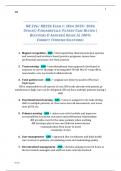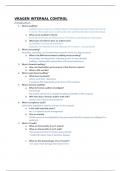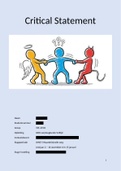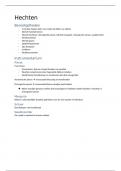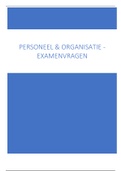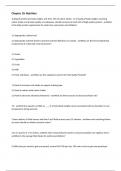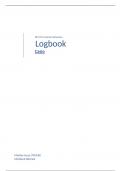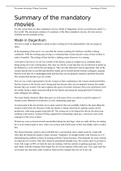NR
NR 226/ NR226 EXAM 1: (NEW 2025/ 2026
UPDATE) FUNDAMENTALS: PATIENT CARE REVIEW |
QUESTIONS & ANSWERS| GRADE A| 100%
CORRECT (VERIFIED SOLUTIONS)
1. Magnet recognition - ANS ✓the hospital has clinical promotion systems
and research and evidence-based practice programs; nurses have
professional autonomy over their practice
2. Team nursing - ANS ✓interdisciplinary team approach developed in
response to severe shortage of nursing after World War II- team effort,
team leader, care is provided collaboratively
3. Total patient care - ANS ✓-original care delivery model of Florence
Nightingale
-RN is responsible for all aspects of care, RN works directly with patient, pt
satisfaction is high, care can be delegated, RN can have multiple patients during a
shift
4. Functional based nursing - ANS ✓nurse is assigned to do tasks during
shift to multiple patients, ex. One nurse does all assessments, one nurse
does all VS, etc.
5. Primary nursing - ANS ✓-places rns at the bedside and improves
accountability for patient outcomes and professional relationships
-RN provides care for the same patients when working
-RN develops plan of care and delivers interventions
-communication from nurse to nurse
-continuity of care
6. Case management - ANS ✓approach that coordinates and links health
care services to patients, streamlining costs and maintaining quality
7. Decentralized management - ANS ✓decision making is moved down to
the level stand, managers and staff are more actively involved
NR 226
, 2
NR
8. Responsibility - ANS ✓duties and activities that an individual is
employed to perform
9. Authority - ANS ✓legitimate power to give commands and make final
decisions specific to a given position
10. 5 rights of delegation - ANS ✓right task
Right circumstance
Right person
Right direction/communication
Right supervisor
11. What are nursing considerations during delegation of task? -
ANS ✓appropriate patient setting, available resources, other relevant
factors
12. Civil laws - ANS ✓protect the rights of the individual. Damage for
civil laws usually involves the payment of a fine.
13. Common laws - ANS ✓results from JUDICIAL decisions concerning
individual cases. Most of these revolve around negligence and malpractice.
14. Regulatory law (aka administrative law) - ANS ✓defines your
duty to report incompetent or unethical nursing conduct to the Board of
Nursing.
15. Tort - ANS ✓a civil wrong made against a person or property
16. Intentional tort - ANS ✓willful acts that violate another's rights
(assault, battery, false imprisonment)
17. Assault - ANS ✓may be actual, or it may result from a threatened
action, such as giving a person an injection or threatening to restrain a
patient who has refused a procedure.
18. Battery - ANS ✓intentional touching without consent
19. False imprisonment - ANS ✓an example of which is restraining a
patient without justification
NR 226
, 3
NR
20. Invasion of privacy - ANS ✓the release of a patient's medical
information to an unauthorized person
21. Slander - ANS ✓When one person speaks falsely about another
person
22. Libel - ANS ✓Written defamation of character
23. Negligence - ANS ✓Conduct that falls below the standard of care
24. Malpractice - ANS ✓Referred to as professional negligence; below
the standard of care
25. Informed consent - ANS ✓Person's agreement to allow something
to happen based on disclosure of risks, benefits, and alternatives
26. Proof of negligence - ANS ✓-The nurse owed a duty to the patient.
-The nurse did not carry out the duty or breached it.
-The patient was injured.
-The patient's injury was caused by the nurse's failure to carry out that duty.
27. Nursing (ANA definition) - ANS ✓the protection, promotion, and
optimization of health and abilities, prevention of illness and injury,
facilitation of healing, alleviation of suffering through the diagnosis and
treatment of human response, and advocacy in the care of individuals,
families, groups, communities, and populations
28. Why is prioritizing important? - ANS ✓because it allows you to
see relationships among patient problems and avoid delays in taking
action that can lead to serious complications for patient
29. List some of the code of ethics for nurses - ANS ✓promotes for,
advocates for, and strives to protect the health, safety, and rights of
patients
30. Ethical dilemma - ANS ✓having to choose between 2 conflicting
principles, causes distress and controversy
31. Values clarification - ANS ✓helps you to explore values and
beliefs/feelings and decide how to act on personal beliefs and respect the
values of others, even if they differ form yours.
NR 226

